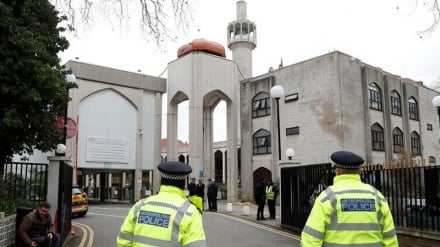The Abrahamic Hajj (10) Eid al-Adha
Welcome to the 10th episode of “The Abrahamic Hajj”, and today on the 10th of Zilhijja, which is celebrated as Eid al-Adha we offer our heartiest congratulations to Muslims all over the world. We have prepared for you a special programme on this auspicious occasion of the Feast of Sacrifice.
The 10th of Zilhijja is the day of remembrance of the Prophet Abraham’s firm and unflinching faith in God and how he obeyed the divine commandment to offer his firstborn son, Ishmael, as sacrifice. It is the Day on which the All-Merciful Lord accepted the Great Patriarch’s sincere offer by miraculously replacing his son, at the last moment with a ram from heaven, so that Ishmael will live, marry, produce children, and be the ancestor of Prophet Mohammad (blessings of God upon him and his progeny). God says in ayah 107 of Surah Saffaat:
“And we ransomed him with the Great Sacrifice.”
The words of God in deferring the sacrifice of Ishmael for the future and ransoming it on this day in pre-history with the Great Sacrifice, or “Zibhin Azeem”, as the holy Qur’an says, is reference to the martyrdom of the Prophet of Islam’s grandson, Imam Husain (AS), along with his sons, brothers, nephews, and companions, in the full limelight of history, in order to save Islam and humanitarian values.
The 10th of Zil-Hijjah thus marks the climax of the Hajj rituals on the plain of Mena near Mecca where the pilgrims stone the first of the symbolic devil to demonstrate their determination against all forms of temptations and tyranny, and then offer sheep, cattle, or camel, as sacrifice. This is followed by the ritualistic shaving of the heads by male pilgrims and coming out of the shroud-like white Ehram to don normal clothes, thus signaling a new birth or the start of a virtuous life, following forgiveness of sins by the All-Merciful Creator. This is indeed the pinnacle of monotheism. No wonder, ayah 79 of Surah Anaam has preserved Prophet Abraham’s remarkable words:
"Indeed I have turned my face toward Him who originated the heavens and the earth, as a Hanif, and I am not one of the polytheists."
In Islamic culture, Eid has a specific meaning. It means happiness or state of joy on the successful performance of duties. A Muslim is a person who is committed to the responsibilities entrusted by God. For this reason, whenever our work is sincerely and solely for the sake of God and is pleasing in the sight of God, as well as pleasing to our self, it is the day of Eid. Thus, the Hajj pilgrims who are still encamped on the Plain of Mena to observe the rest of the rituals for the next two days, have the opportunity to express their sincere wishes to God, and hopefully these will be accepted.
The Prophet of Islam’s 6th Infallible Heir, Imam Ja’far Sadeq (AS) says Mena was so named because Archangel Gabriel asked Prophet Abraham to express his wish. It is the place where the temptations of the Satan came to naught on three occasions – when he tried to make Ishmael disobey Abraham regarding the divine commandment of sacrifice; when he attempted to mislead Hajar against her husband Abraham’s intention; and when he failed to dissuade Abraham from carrying out God’s commandment. Hence the three columns in Mena indicating the places where Satan approached the three blessed persons are stoned to this day as the ritual of the “Rami al-Jamaraat”, as part of the obligations of the Hajj pilgrims to drive away the internal and external Satans.
The meat of the animals sacrificed in Mena is donated to the poor so that in this way the pilgrims attain the proximity of God Almighty. In ayah 37 of Surah Hajj, God says:
"It is not their flesh or their blood that reaches Allah. Rather it is your Godwariness that reaches Him."
This ayah means to say that neither the flesh nor the blood of the animals sacrificed reaches God, but it is the piety and sincerity of a person which is important to Allah. Iran’s contemporary Islamic Thinker, Ayatollah Mohammad Rayshahri says: Piety has certain degrees and sacrifice is the highest point of piety. The first degree is to avoid wrongdoing; the still higher degree is to avoid evil acts including sins, and the highest degree is to sacrifice in the way of God whatever one has in his/her possession. In other words, when we are ready to give up all things and persons dear and near to us, and devote ourselves wholly to God, then we have reached the absolute state of the Ultimate Beloved and Besought of all, that is, God Almighty, like Prophet Abraham practically demonstrated.
The rituals of Eid al-Adha have historical roots going back in antiquity to Prophet Abraham. He was wholly resigned to the Will of God in all affairs. The holy Qur’an well presents glimpses of his selfless servitude to God, as well as that of his firstborn son, Ishmael.
Abraham and his wife Sarah had grown old and failed to produce any child. Abraham prayed to God for an heir to succeed. The prayer was answered when his wife offered to him as the second spouse, the Egyptian maid Hajar, who conceived and thus Ishamel was born. A few years later, God granted another son to Abraham, and this time through his wife Sarah, who was old and well beyond child-bearing age. After the miraculous birth of Isaac, however, Sarah became jealous of Hajar and Ishmael and told Abraham to remove them from her sight.
On God’s command, Abraham took Hajar and Ishmael to the remote Arabian Desert in the then obscure place called Mecca and left them there. In this waterless tract, after a mother’s anguish for water for her thirsty son as demonstrated by her running between the hillocks of Safa and Marwa, the ground suddenly gushed with a spring from under the feet of little Ishmael. This is the holy well of Zamzam from which pilgrims drink till this day. When Ishmael had entered his teens, Abraham returned to Mecca, where he was ordered by God to sacrifice his firstborn son. The devout Abraham related his dream to Ishmael, who told the doting father to carry out God’s commandment without any hesitation. Ayah 102 of Surah Saffaat informs us in this regard:
"Father! Do whatever you have been commanded. If Allah wishes, you will find me to be patient."
As we said earlier, Abraham and Ishmael both emerged victorious from this divine tribulation, without the least harm, thereby proving the lofty degree of their faith to all subsequent generations. God rewarded both father and son, and ordered them to rebuild the holy Ka’ba which was lying in ruins since the great deluge of the days of Prophet Noah. After completing this mission, God ordered them to invite mankind to perform pilgrimage. In the wilderness of Mecca Abraham made the call that reverberated through hills and valleys, ricocheted around the world and piercing the layers of the time zone, echoed in the ears of the yet to be born future generations, who on answering his call, were to become pilgrims. Till this day, pilgrims from all over the world flock to the Ka’ba for the monotheistic Hajj that was revived by Prophet Mohammad (blessings of God upon him and his progeny). Thus in ayahs 109 and 110 of Surah Saffaat, God says of His devoted servant:
"Peace unto Abraham!"
"Thus do We reward the virtuous."
As the curtain comes down on rituals of the annual Hajj pilgrimage, we pray to God Almighty to awaken the innate human nature of Muslims and of all mankind, and this is possible by reflecting on the words of God in deferring the sacrifice of Ishmael and ransoming it with the Great Sacrifice, or “Zibhin Azeem” that the Immortal Martyr of Karbala offered to redeem humanity.
Let us jolt our conscience to awaken ourselves from the slumber of sedition and satanic insinuations by giving peace and co-existence, on the basis of mutual respect and self-dignity, a chance, since the message of Adha is for all humanity. It teaches us how to sacrifice our desires on the altar of obedience to our Loving Creator, to Whose Will we ought to fully submit ourselves if we really intend to be human beings in the correct sense of the term.
A true human being sacrifices his carnal intentions so at to develop the spirit of moral ethics and resistance against temptations of the devil, by rising above divisive and destructive tendencies including hatred of fellow humans on the superficial basis of skin colour, ethnicity, languages spoken, social status, and beliefs.
Of course, beliefs that drive an individual or a group toward slandering of the beliefs of others, indulgence in sins, disturbance of peace, destabilizing of society, exploitation of others, reducing women to a carnal and commercial commodity, creation of crisis, imposing of economic sanctions, misuse of nuclear energy to manufacture weapons of mass destruction, launching of wars, and unleashing of bloodshed, are without the least doubt, a wrong set of beliefs.
Such beliefs are definitely not God-oriented, and are the cause of the current calamities plaguing societies, countries, regions, and the whole world. Those who profess such beliefs and are indeed the culprits of chaos all over the globe, should take stock of themselves before it is too late to save their souls from eternal damnation.
Unless such beliefs are discarded or rectified, our Planet will neither be free of terrorist outfits of all hue and colour, nor of the super terrorists, whose wealth, political power, technology, scientific achievements, media and all other resources are certainly at the service of Satan and against humanity.
AS/MG


